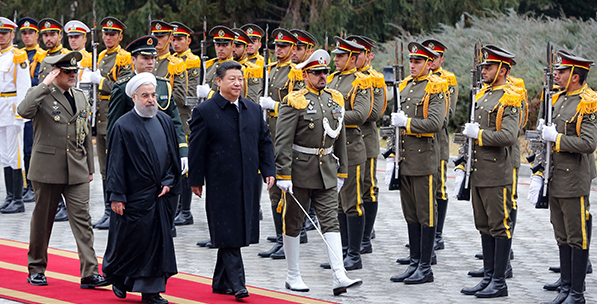
As the regional rivalry between Saudi Arabia and Iran reached ever new heights with a potential escalation following Riyadh’s execution of prominent Shiite cleric Nimr al-Nimr, the entrance of a new major actor to the troubled waters of Middle Eastern politics was taking place. So far, President of China Xi Jinping and Premier Li Keqiang have visited almost every region in the world in the context of their multidimensional foreign policy approach, but not the conflict-ridden Middle East. Therefore, when Xi embarked on a major diplomatic tour into the region comprising Saudi Arabia, Iran and Egypt there were plenty of remarks in global media outlets concerning the critical decision of the "Middle Kingdom" to finally come out from the sidelines and take a step forward to become a global player.Not least because the Middle East represents the most difficult regional geopolitical realm in which China’s non-interference into other countries’ domestic affairs policy and staunch neutrality could be maintained due to endless conflicts among regional neighbors. As a pretext to the historic visit, Xi was trying to gradually inject China into the complicated Middle Eastern political seen by inviting representatives of Syrian President Bashar Assad’s regime and the opposition in Syria to Beijing to promote a peaceful resolution. He also dispatched his deputy foreign minister to Riyadh and Tehran at the peak of the crisis to mediate between the sides and to recommend calm. More importantly, Xi made a last minute alteration in his long-planned visit itinerary and decided to visit Tehran instead of the previously planned United Arab Emirates (UAE). This significantly raised the profile of his historic tour at a time when the spotlights of global investors are all focused on Iran, striving for economic opportunities in the post-sanctions era. As one of the major global importers of energy, China’s main interest in Saudi Arabia and Iran is expectedly economic, based on the maintenance of cheap and reliable supply of oil. Currently, Saudi Arabia is China’s biggest supplier of crude oil and bilateral trade stands around $69 billion. During Xi’s visit, he and King Salman inaugurated an energy research center and opened the Yasref Oil Refinery, a major joint venture between Saudi Aramco and China’s Sinopec. They also signed a memorandum of understanding for the construction of a high-energy nuclear reactor. But China’s diplomatic hyperactivity in the Middle East cannot be confined to pure economic opportunism based on maintaining cordial relations with all economic partners. On the contrary, Beijing seems to have realized a diplomatic opportunity space created by the lack of interest in Middle Eastern politics on the part of U.S. President Barack Obama’s administration and the fully fledged engagement of Russia in the Syrian civil war, allying itself clearly with the Shiite camp. Therefore, neither Washington nor Moscow are in a position to act as an honest broker in the tension between Iran and Saudi Arabia, which presented a perfect moment for China’s entry onto the Middle Eastern stage as a global power. Therefore, Xi wanted to become the first global leader to visit Tehran following the lifting of international sanctions to which China has contributed. Commercially, Iran is the favorite trading partner and logistical hub for China in the region, a status that was confirmed with 17 new agreements of cooperation in the areas of energy, trade and industry and a comprehensive strategic partnership document. The plan is to raise bilateral trade to $600 billion in 10 years, and the key to that vision is China’s One Belt One Road initiative, which includes ambitious rail, road and port projects, including a high-speed rail network connecting Xinjiang in western China with Tehran via Almaty, Bishkek and Ashkhabad. Iran is geo-strategically important in this vision as it stands at a crossroads at the edge of Asia before the route of the ancient Silk Road reaches Turkey and Europe. Given the deeply skeptical approach of Iran’s Shiite establishment toward the U.S. and Europe despite the recent rapprochement, China’s autonomous stance in the world system provides comfort for long-term collaboration. While China has long maintained a policy of non-interference in other countries’ domestic politics, harmony and economic cooperation, this might be just about to go through a radical change as far as the Middle East is concerned. China is becoming a superpower and will act like one. [Daily Sabah, January 30, 2016] |
Tag: CHINE FILES
-

CHINA FILES : China Enters the Middle Eastern Theater
